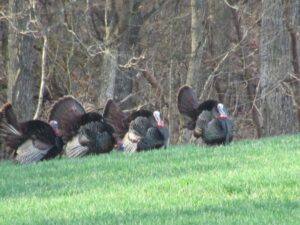Spring Turkey Season in Virginia begins with the special youth days this weekend and the season opens for all next Saturday. I’ve been looking forward to this time for several weeks and am anxiously anticipating listening to one the most awesome sounds in the Virginia woodlands: a wild turkey’s gobble!
Just being in the springtime woods is reward enough as the fresh growth bursts forth from every living plant. In addition, a thousand birds are singing for their dates and filling the air with a beautiful symphony of tunes and chirps. An added bonus is sometimes enjoyed with the discovery of spring wildflowers and morel mushrooms pushing up through last fall’s leaf litter.
Hearing and seeing turkeys is icing on my cake and the privilege to engage one with calls is the ultimate rush. Spring turkey hunting, however, is different than most other hunts and requires special tactics. A hunter first locates a tom before daylight by his gobbles on the roost and makes a silent beeline to within a hundred yards or so of that location. He finds a large tree to sit against, gets comfortable and begins to answer the gobbles with soft hen calls.
Ideally, the gobbler flies off the roost toward the hunter who then must hold the gun ever ready and scan the woods for the darting white head of the excited bird. Even more challenging is to sit perfectly still in complete camo while continuing to call and entice the old boy to within 30 yards for an attempted shot.
Gobblers are famous, however, for hanging up just out of range or for appearing suddenly to the rear of the hunter who then has no chance. Turkeys have some of the best eyes in the animal kingdom and can detect any color, shape, or minute movement that’s out of place in the woods. Whenever they do, the jig is up and the wise old bird becomes a little wiser.
Turkey hunters must practice calling in order to imitate a hen as closely as possible. Just as all humans have different voices, birds do as well so variations are allowed, but there is a fairly narrow range of acceptability. This requires hunters to use a variety of methods including mouth, box, slate, and whistle calls. Electronic methods are illegal so skill and practice are essential.
One temptation turkey hunters must avoid is to fall in love with their own calls. It’s possible to practice so much that one prefers one’s own sounds to those of real hens. In fact, it’s even possible to win turkey calling competitions while still not pleasing the toughest judge of all, the wary old tom.
This danger also exists in our worship. We can easily fall in love with our own songs, rituals, and routines that please and satisfy us while failing to ascertain whether it’s what God wants. Our worship should be God centered and God focused regardless of how it makes us feel or how wonderful others think it is. We can even win “competitions” by attracting more people than other churches. But ultimately, if it’s not what God wants, like the old gobbler, it doesn’t matter one iota.
This, of course, should make us ask, what kind of worship does God want from us? In John 4:24, Jesus tells us clearly, “The kind of worshippers the Father desires are those who worship Him in spirit and in truth.” That certainly leaves much latitude for various music styles and worship orders, but it must always be sincere and real. It has to come from our hearts and be directed towards God’s. Just going through the motions is not true worship.
Just as turkey hunters often listen to real hens calling in the wild, we would do well to listen and observe worshipers in heaven. In the Bible we catch occasional glimpses of those and we see that it’s all about the Father and the Son empowered by the Holy Spirit. These observations should inform, inspire, and shape our own worship not only on Sundays, but every moment of our lives.
I’m looking forward to worshipping in the woods as I chase the turkeys this spring and I pray that my calls please the toms. Even more, I pray that my prayers, songs, attitudes, thoughts, and words would please the turkeys’ Maker and Master as I worship Him daily.
Desiring to please Jesus, George